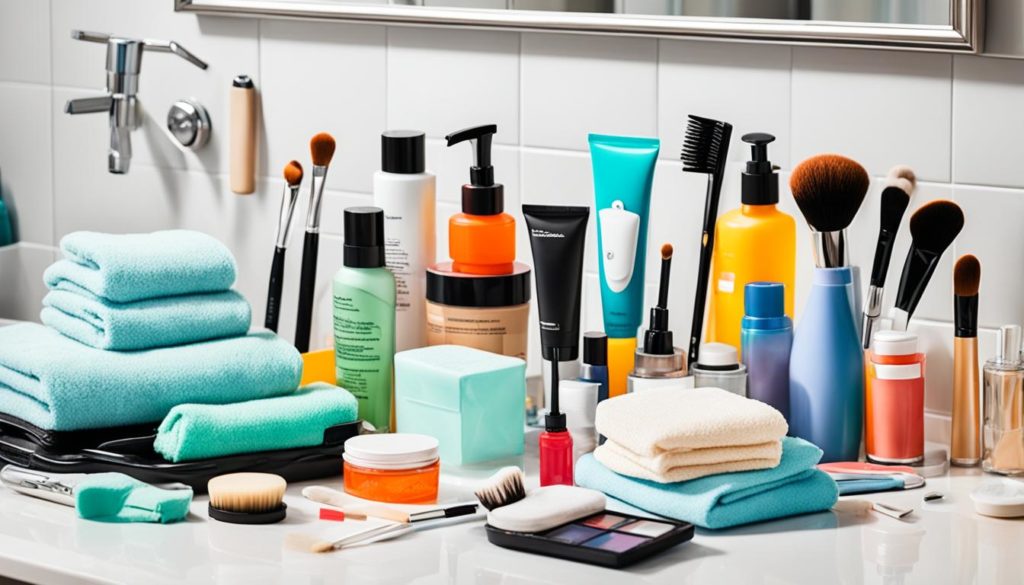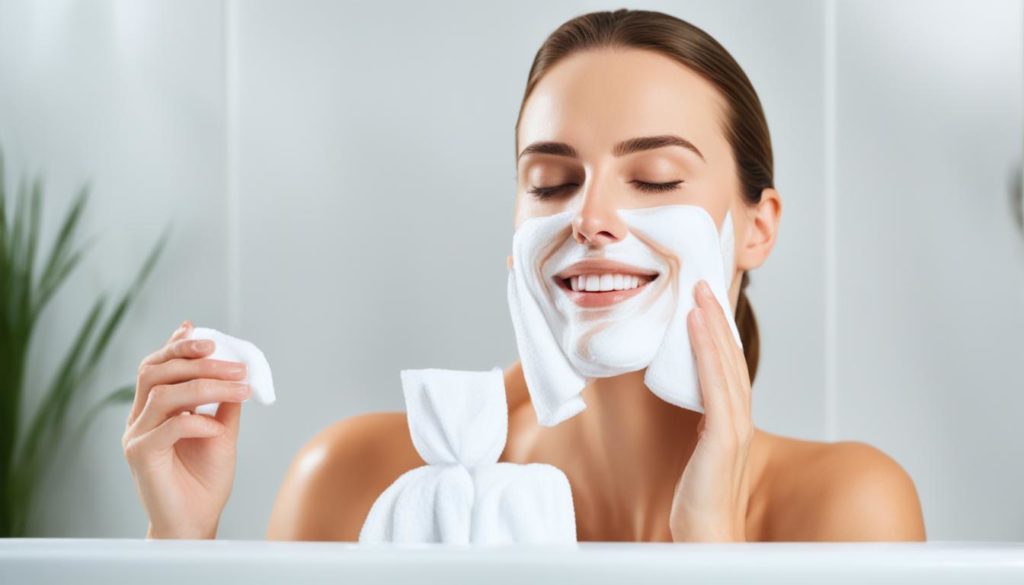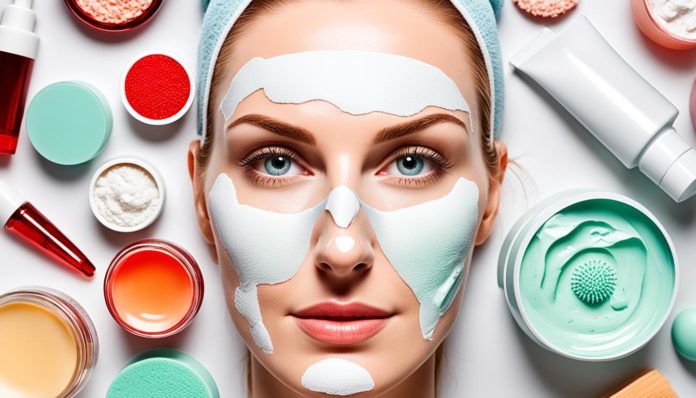About 50 million Americans face acne each year, making it the top skin issue in the U.S. It’s clear that acne is widespread, showing the need for strong treatment plans. If you’re fighting off occasional spots or ongoing acne, getting clear skin can be achieved with the correct steps.
Acne varies from slight irritations to major skin problems. It can hurt your confidence and feelings. But don’t worry. A mix of trusted skincare routines and treatments can bring back your control. This piece will show you how to tackle acne. You’ll learn about over-the-counter options, natural fixes, and changes in your life. All aim to help you get clear skin and manage acne.
Key Takeaways
- Acne impacts 50 million Americans each year, making it the most common skin condition.
- An effective routine is crucial for achieving clear skin.
- Skincare tips range from OTC products to natural remedies and lifestyle adjustments.
- Understanding and addressing acne is essential for blemish control and emotional well-being.
- This guide offers practical methods for managing and taming acne.
Understanding Acne: Causes and Triggers
Acne starts when hormones, diet, and the environment affect your skin. It’s a common problem many face.
Hormonal Factors
Hormone changes are a big cause of acne. This is especially true for teens, pregnant women, or those on their period. These changes can lead to more breakouts, making regular skincare very important.
Dietary Influences
What you eat affects your skin too. Eating lots of sugary foods or white bread can make acne worse. Knowing this helps you pick the right skincare products and diet to fight off acne.
Environmental Factors
Pollution and humidity can also cause acne by blocking your pores. By knowing what triggers your acne, you can choose the best skincare steps. This way, you can keep your skin clear.

Effective Skincare Routine for Clear Skin
A consistent skincare routine is key for clear skin. By following these steps, you can greatly improve your skin’s health and appearance.
Cleansing
Cleansing your face every day is the start of good skincare. It’s important to use a gentle cleanser. This helps remove dirt, makeup, and oil without harming your skin. Make sure the cleanser fits your skin type.

Exfoliation
Exfoliating helps get rid of dead skin that can clog pores. But do it gently, no more than twice a week. Your skin will look smoother and more glowing.
Moisturizing
Keeping your skin hydrated is very important. Pick a moisturizer that’s right for your skin type. The right moisturizer keeps your skin balanced and clear.
Sun Protection
Sunscreen is a must in your daily routine. Use a broad-spectrum SPF to protect from harmful UV rays. These rays can make acne worse and cause scars. Sun protection is crucial for keeping skin healthy.
Starting with cleansing, exfoliating, moisturizing, and then protecting from the sun improves skin health. These steps form a solid base for clear skin. Stick to them for lasting results.
Topical Treatments for Blemish Control
Effective acne remedies often start with topical treatments. Options like retinoids, benzoyl peroxide, and salicylic acid help those with acne. They make a big difference in managing this condition.
Retinoids boost cell turnover and stop pores from clogging. This greatly lowers pimple counts. If you have sensitive skin, start with a low concentration.
Benzoyl Peroxide stands out among acne treatments. It kills bacteria that cause acne and lowers swelling. You can find it in gels, creams, and cleansers.
Salicylic Acid exfoliates and opens up pores. It also eases swelling and redness. It’s especially good for mild acne and for those who get blackheads and whiteheads.
| Ingredient | Function | Usage | Best For |
|---|---|---|---|
| Retinoids | Promotes cell turnover | Night application, start low | Persistent acne, aging skin |
| Benzoyl Peroxide | Kills bacteria | Morning and night, as needed | Inflammatory acne |
| Salicylic Acid | Exfoliates, unclogs pores | Daily use, avoid overuse | Blackheads, whiteheads |
Adding these treatments to your daily skin care can really help. But, start using new products slowly to see how your skin responds. These acne fighters are key for clearer skin as time goes on.
Natural Remedies for Acne Solutions
Looking into natural solutions for acne can be highly effective. These remedies use nature’s power to tackle acne. They work towards healthier, clearer skin.
Tea Tree Oil
Tea tree oil is well-known for its strong antibacterial qualities. It’s a top pick for natural acne care. By reducing inflammation and battling acne-causing bacteria, it helps lessen breakouts. It also calms irritated skin.
Aloe Vera
Aloe vera is famous for its calming and anti-inflammatory effects. When you apply aloe vera gel to the skin, it eases redness and swelling. It heals and hydrates dry or upset skin, too.
Honey and Cinnamon Masks
Honey and cinnamon masks cleanse the skin softly while fighting acne. Honey’s antibacterial traits, combined with cinnamon’s anti-inflammatory effects, tackle acne bacteria. This duo enhances skin health.
Tame Acne with Dermatologist-Recommended Treatments
If you’re dealing with stubborn or tough acne, store-bought products might not always work. It’s important to see a skincare professional. They can offer a treatment plan that’s just right for your skin. Dermatologist acne treatments offer a wide range of options, giving complete care and effective results.
Dermatologists often suggest prescription-strength topicals to tackle acne right at its source. For example, retinoids boost cell renewal and stop pores from getting clogged. Then there’s benzoyl peroxide, well-known for fighting bacteria. These treatments are usually stronger than what you can get without a prescription.
In tougher cases, taking medicine by mouth may be needed. Antibiotics help calm inflammation and kill off the bacteria that cause acne. For deep, cystic acne, isotretinoin is a go-to since it cuts down on oil production.
There are more high-tech treatments dermatologists provide for amazing results:
- Laser treatments help lessen acne scars by increasing collagen.
- Chemical peels deeply exfoliate the skin, getting rid of dead cells and encouraging new growth.
- Light therapy goes after the acne-causing bacteria, helping to reduce flare-ups.
To fight acne effectively, a custom approach is key. Going to a dermatologist for professional skincare can lead to major, lasting improvements. This way, you can say goodbye to acne for good.
Diet and Lifestyle Changes for Acne Prevention
Acne isn’t just about skincare. A whole lifestyle including a good diet is key. Here, we’ll delve into diet and life changes for clear skin.
Healthy Eating Choices
Eating well is at the heart of preventing acne. A diet good for your skin is full of fruits, vegetables, and lean meats. Stay away from high-glycemic foods and less dairy. These can raise blood sugar fast, causing more inflammation and oil, leading to acne.
Stress Management
Stress really affects your skin, causing more acne. Techniques like mindfulness and meditation, along with sleeping well, help control stress. When you’re less stressed, your skin looks better. It supports a healthy lifestyle for clearer skin.
Exercise and Hydration
Exercise boosts blood flow and nourishes skin cells. Sweating also clears pores. Drinking water is crucial—it helps cleanse your body and shows in your skin. Ensure you stay clean after sweating to avoid acne. These steps are key for healthy skin.
To sum up acne prevention, these elements are vital:
| Aspect | Details |
|---|---|
| Healthy Eating | Include fruits, vegetables, lean proteins; avoid high-glycemic and dairy products |
| Stress Management | Practice mindfulness, meditate, and ensure adequate sleep |
| Exercise and Hydration | Regular exercise with good hygiene; drink plenty of water |
Common Mistakes to Avoid in Skincare
Many people trying to improve their skin actually make common skincare mistakes. These mistakes can make acne worse. It’s important to know what to avoid for better acne prevention.
Over-Washing Face
Washing too much can remove natural oils from your skin. This makes your skin oily again to balance it out. Too much oil leads to more acne. It’s best to wash your face just twice a day with a gentle cleanser for acne prevention.
Skipping Sunscreen
Not using sunscreen for acne-prone skin can make acne scars worse and harm your skin. The sun’s rays cause inflammation and more breakouts. Use a sunscreen that doesn’t clog pores and is made for acne-prone skin to stay safe from the sun.
Using Harsh Products
Skincare products with harsh ingredients can upset sensitive, acne-prone skin. Choose gentle, calming ingredients instead. Avoiding these skincare mistakes is crucial for keeping your skin healthy and clear.
Skincare Tips for Maintaining Healthy Skin
Maintaining healthy skin is a trek that needs love and effort. For true results, a long-term skincare plan is key. Here, find tips for clear, glowing skin.
Consistency and Patience
Being consistent with your skincare routine is key. You must apply your skincare daily to see changes. Being patient is also a must as good results take time. Remember, each small step leads to a big difference.
Patch Testing New Products
Always patch test new skincare items to avoid bad reactions. Put a bit of the product on your skin, in a hidden spot. Watch for any bad signs for 24 hours. Patch tests protect your skin and keep it clear.
Listening to Your Skin
Paying attention to what your skin tells you is vital. Change your care plan to fit your skin’s current needs. Whether dealing with dryness or sensitivity, respond to keep your skin happy.
Choosing a whole-skin approach and strengthening your skin barrier leads to lasting, glowing skin. Enjoy a radiant look for years.
Conclusion
When talking about preventing acne, a well-rounded plan is crucial. Knowing what causes and triggers acne helps start the treatment right. Tackling these factors can help lessen breakouts and make skin healthier.
Having a good skincare routine is essential. This means cleaning, exfoliating, moisturizing, and protecting your skin from the sun. Adding specific treatments like tea tree oil and aloe vera helps. For tough acne, doctors have special treatments to offer.
It’s also vital to eat well, manage stress, and stay active. These improve your skin. Avoid mistakes like washing too much or using rough products. Staying disciplined in your care and listening to what your skin needs is your best strategy for clear skin.
FAQ
What are the most effective acne treatments available over-the-counter?
You can find treatments like benzoyl peroxide, salicylic acid, and retinoids over-the-counter. They help by lowering inflammation, unclogging pores, and boosting skin renewal. To avoid irritation, start with low concentrations and follow the product instructions carefully.
How can I build an effective skincare routine to prevent acne?
For preventing acne, a regular skincare routine is key. Begin with a mild cleanser to take off dirt. Then, use a scrub a few times weekly to remove dead cells.
Always moisturize daily to keep your skin’s barrier strong. And don’t forget sunscreen to protect from the sun and lessen scars.
What role do hormonal factors play in causing acne?
Hormones can cause more oil to be made, blocking pores and leading to acne. This often happens during puberty, periods, pregnancy, or when stressed. Hormonal acne typically shows up on the lower face. A dermatologist can offer advice on how to handle these breakouts.
Can diet affect acne, and if so, what should I avoid?
Diet indeed impacts acne. Eating lots of sugary foods and refined carbs can raise insulin, making acne worse. Dairy might also cause acne for some people. Stick to a diet full of fruits, veggies, and lean proteins for better skin.
Are there natural remedies for acne that actually work?
Yes, natural options can help. Tea tree oil fights bacteria, while aloe vera calms and reduces redness. Honey and cinnamon masks also battle bacteria. Always do a patch test first to avoid any skin reactions.
How do dermatologist-recommended treatments help with severe acne?
For tough acne, doctors may suggest prescriptions, oral meds, or even laser therapy. These stronger methods can provide better results. Dermatologists customize the treatment to fit each person’s skin needs.
What lifestyle changes can help in the prevention of acne?
A healthy way of living is great for avoiding acne. Eat well, find ways to deal with stress, exercise regularly, and drink plenty of water. These habits are beneficial for your skin.
What common mistakes should I avoid in my skincare routine to prevent acne?
Avoid washing too much, skipping sunscreen, and using harsh products. Over-washing can make your skin oilier, not wearing sunscreen can darken scars, and harsh products can irritate. Gentle and consistent care is best.
How do I maintain clear and healthy skin in the long term?
Keeping skin clear needs persistence and patience. Stick to a gentle care plan, test new items before full use, and tune into your skin’s needs. As seasons and your skin change, adjust your regimen for lasting health.


